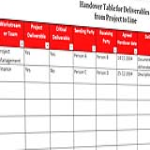Project Management Literature Review

Speichern, ausfüllen, drucken, fertig!
How to create a Project Management Literature Review? Download this Project Management Literature Review template now!
Verfügbare Gratis-Dateiformate:
.pdf- Dieses Dokument wurde von einem Professional zertifiziert
- 100% anpassbar
Business Unternehmen Life Privat Projectmanagement Projektmanagement management Verwaltung project Projekt Projects Projekte Literature Review Examples Literaturübersicht Beispiele
Adequate communication is essential in order to finish projects successfully. In order to gain truthful and accurate information, you need to make sure that program- or project managers are able to make rational and correct decisions. For those who have, what we call, a "high-performance mindset”, we know they prefer to work with the latest update of professional project management templates, in order to achieve their goals faster. We are certain this Project Management Literature Review will be of value.
Feel free to download this Project Management Literature Review, or simply browse through our other basic or advanced template designs. They are intuitive and in several kinds of formats, such as PDF, WORD, XLS (EXCEL including formulas and can calculate sums automatically), etc.
Using this project management template guarantees that you will save time, cost and efforts and makes you more successful in your project, work and business!
Completing your Project Management Literature Review was never simpler! Download this project management template now!
International Journal of Business and Management August, 2008 Projects and Their Management: A Literature Review Guru Prakash Prabhakar Bristol Business School University of the West of England Coldharbour Lane, Frenchay Campus Bristol- BS16 1QY, UK Tel: 44-117-328-3461 E-mail: guru.prabhakar uwe.ac.uk Abstract Over the years and more importantly in the recent past projects have been used as a delivery mechanism to do business and accomplish objectives.. At a minimum, all projects need to have well defined objectives and sufficient resources to carry out all the required tasks.” In lines of the definition provided by Pinto Slevin (1988), and accepted for the purpose of this research, a project can be defined as possessing the following characteristics: (1) A defined beginning and end (specified time to completion) (2) A specific, preordained goal or set of goals (performance expectations) (3) A series of complex or interrelated activities (4) A limited budget Diallo Thuillier (2003) reviewed the project management literature outlined a set of evaluation dimensions which appear regularly although not with the same occurrence: (1) Respect to the three traditional constraints (2) Satisfaction of the client (3) Satisfaction of the objectives as outlined in the logical framework (4) Project impacts (5) Institutional or organizational capacity built in the organization by the project (6) Financial returns (in the case of productive projects) or the economic or social benefits (in the case of public sector projects), and (7) Project innovative features (outputs, management or design) 3 Vol.. Project life cycle generally defines: (1) The tasks to be accomplished in each phase or sub- phase (2) The team responsible of each of the phases defined As advocated Archibald Voropaev (2003), there is a general agreement that the four broad, generic project phases are (common alternative terms are shown in parentheses): (1) Concept (initiation, identification, selection.) (2) Defin
HAFTUNGSAUSSCHLUSS
Nichts auf dieser Website gilt als Rechtsberatung und kein Mandatsverhältnis wird hergestellt.
Wenn Sie Fragen oder Anmerkungen haben, können Sie sie gerne unten veröffentlichen.


